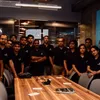This Binny Bansal-backed startup uses real-world problems to upskill product developers
Crio.Do, founded by a former Flipkart employee, offers a learning platform for engineers to make them industry-ready. The startup is backed by Binny Bansal and other former Flipkart employees.
Rathinamurthy R was one of Flipkart’s earliest product managers. In his last role at the homegrown ecommerce decacorn, he was the Senior Director of Product Management, overseeing ’s marketplace operations, including selection, seller growth, inventory management, fulfilment, and more.
His direct exposure to the internet ecosystem for nearly seven years made him realise that even though India’s IT industry had transitioned from a software services-based market to a software product-based one, organisations continued to face a talent crunch.
There was a serious dearth of quality product developers. Sure, India had hordes of engineering graduates every year, but they lacked real-life product development experience. The industry-ready engineers were being hired by big brands and well-funded startups alike. But, the smaller ones found it incredibly hard to attract good talent.
“If you want to build a big company, one of the biggest levers is talent. It plays a critical role. Smaller startups can’t attract a lot of talent; Flipkart got good talent because of its brand name,” Rathinamurthy tells YourStory.

Rathinamurthy R, Co-founder, Crio.Do
After quitting the ecommerce giant in February 2018, Rathinamurthy wanted to fix this talent gap. At the same time, he also wanted to start his own venture.
“Flipkart has a very entrepreneurial culture. Being a part of a journey like that inspired me to create impact and to do something on my own,” he says.
Along with Sridher Jeyachandran (a product engineer with stints at Google and NetApp), Rathinamurthy founded in May 2018.
Based in Bengaluru, Crio.Do is a learning and skilling platform for software developers. With the motto ‘learn by doing’, the startup empowers engineers and developers with practical skills by making them solve real-world problems.
Core platform and what it solves
Crio.Do focusses on experiential and applied learning, and uses work-like micro modules (or micro experiences) instead of passive video tutorials to make engineers industry-ready.
Its learning content is contextual and crafted around real-world problem-solving in tech companies. The programmes are powered by data, deep tech, and learning sciences, and are designed for fresh engineers or product developers in the early stages of their careers.
Co-founder Rathinamurthy explains,
“Our learning content is the differentiation. The module has a purpose and that is something you’re building for the next two months. It is not a typical video discourse, which doesn’t ensure accountability and outcome. Our learning is measurable and if you do not solve a problem, you haven’t learned. We create enough work-like scenarios, bring in purpose, autonomy, and context.”
Crio.Do programmes — Crio Accelerate (20 weeks) and Crio Devsprint (eight weeks) — teach foundational and advanced concepts in software product development by simulating real-world scenarios in a work-like environment.

A work-like scenario could mean learning backend engineering at Swiggy or app-based fleet management at Ola, and so on.
“You will be given a real operational problem to solve. Our entire product design is based on that. It is almost like taking up a remote working job,” says the co-founder.
The platform improves developers’ ability to add value in their job from day one and thereby ensure a better career trajectory. At the same time, it also offers recruiters and tech companies a ready pool of engineers with proven product development skills and experience.
Rathinamurthy says, “We had an intuition about the problem at hand. Then, we started spending time at universities and spoke to students, which made us realise that the talent pipeline is broken because the curriculum and pedagogy haven’t evolved at all. The theory is not very relatable, and even recruiters rely more on brand names than on actual product development skills.”
Funding and business growth
In January 2019, Crio.Do raised $1 million in seed funding from the Flipkart Mafia, which included people Rathinamurthy had known and worked with.
The funding round was led by Binny Bansal (Co-founder and Flipkart’s former Group CEO); Amod Malviya, Vaibhav Gupta, and Sujeet Kumar (ex-Flipkart and now Udaan co-founders); Mekin Maheshwari (Flipkart’s former Chief People Officer, now Founder of Udhyam Learning); and Ravi Garikipati (Flipkart’s former CTO).
Rathinamurthy shares, “We had a basic MVP, and we went to angels who are passionate about the problem we were trying to solve and about education. These are some of the top leaders in the ecosystem I worked with.”

Crio.Do team
At the time of funding, Binny Bansal had said, “There is an increasing need for qualified tech talent, which is a global problem and a huge market opportunity. Crio.Do has an exceptional team and their approach towards solving this problem is unique, backed with practical insights and experience.”
In two years, Crio.Do has roped in prominent companies like Flipkart, VISA, Capillary Technologies, Reliance Jio, Goibibo, etc., that are using its learning platform for their employees. Additionally, startups like CRED, Jumbotail, UrbanLadder, Vogo, and others are hiring from its developer talent pool.
Without divulging revenue numbers, Rathinamurthy reveals that Crio.Do is growing at 60 to 70 percent month-on-month. This growth has remained steady even through the coronavirus lockdown. “Hiring has slowed down overall, but there is a lot of interest from the user side. People have more time and are engaging more,” says the co-founder.
Crio.Do was also a part of YourStory’s list of 50 Disruptive Startups in 2019.
Future roadmap and industry landscape
Going ahead, Crio.Do plans to partner with engineering colleges to source fresh graduates for its programmes and make them skilled. It will also scale its product, add more modules and tech skills, and expand its team of 22.
The startup is chasing a market, which sees over four million engineering graduates every year. But despite the growth of India’s software industry and the government push for skilling, quality product developers are a rare breed.
Rathinamurthy says, “It is a real bottleneck. The biggest challenge is to bring a mindset change and make people realise early in their careers that they need to be skilled. To trigger that need is essential.”

Sridher Jeyachandran, Co-founder, Crio.Do
Crio.Do competes with engineering-focussed skilling startups like Skill-Lync, AttainU, Pesto Tech, Bridgelabz, MountBlue, and more.
Online upskilling and reskilling are said to be more than a $2 billion opportunity in India. Further, NASSCOM estimates that over 40 percent of India’s workforce needs to be re-skilled and upgraded by 2022. Hence, Crio.Do has a vast market to tap into.
Rathinamurthy sums up by saying, “When you ask developers where they learned the most, they always talk about a project or a job. So, we are giving them that project they require to develop skills and excel at their jobs.”
Edited by Saheli Sen Gupta











